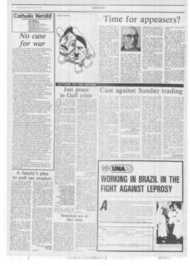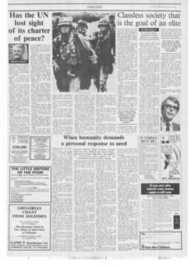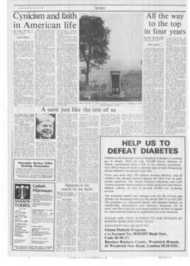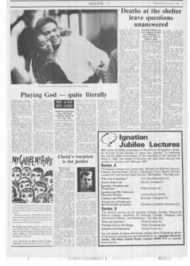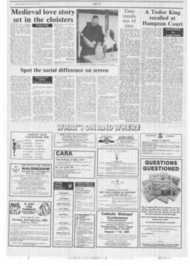Page 1, 11th January 1991
Page 1

Report an error
Noticed an error on this page?If you've noticed an error in this article please click here to report it.
Tags
Share
Related articles
The Pope Has Worked From The Very First Day Of His...
Portrait Of A Year
Pope John's Ghost-writer Reveals The Secrets Of Pacem In...
Anglican Primate And The Germans
Another French Agency Vatican Rumour
Cabinet papers reveal fear of strife over nuncio
by Michael Prescott
FEARS that upgrading the Vatican's diplomatic representation in London might "relight the flames" of religious strife in the UK lay at the centre of one of the liveliest cabinet debates of 1960, according to secret government papers just released.
The discussion was prompted by Selwyn Lloyd, the then Foreign Secretary in Harold MacMillan's Conservative government.
On February 22, 1960, Mr Lloyd submitted a memo to cabinet colleagues. It suggested that as he and the Prime Minister were to visit Italy in March that year and meet the Pope while there, the cabinet should consider upgrading the rank of the diplomatic representative allowed in London from the Vatican.
Details of the discussion have emerged only now, because British secrecy laws dictate that cabinet memos and minutes must be locked in Whitehall vaults for 30 years before they are made available to the Public Record Office in Kew.
The 1960 cabinet papers show Mr MacMillan and his colleagues discussing subjects such as South Africa's Sharpeville massacre and the siting of US Polaris missiles in Scotland. But few of their debates seem to have exercised ministerial minds or split the cabinet as did the issue of Vatican representation.
In the end, the cabinet decided to leave the matter be, rather than upgrade the Vatican's repreent.otiva from Apostolic Delegate to Internuncio, as had been suggested. It was not until the Pope's visit to Britain in 1982 that the Vatican gained higher level representation in London.
Mr Lloyd's memo of February 22, 1960, refers to a June, 1959, letter to the Prime Minister from the Catholic Duke of Norfolk, requesting that an Internuncio be allowed to represent the Vatican in Britain.
Suggesting that the matter be discussed because of the looming prime ministerial trip to Italy, Mr Lloyd lists three reasons in favour of acceeding to the request. It is "a logical measure of recipricocity," he wrote, adding that "it would please Roman Catholics at home" and that "it would please certain European and Latin American countries."
Mr Lloyd then listed four reasons against the move.
First was that "there was no pressing demand for it."
Second, he wrote that "it might relight the flames of religious controversy which (for example in Liverpool) have died down even within my own lifetime."
Third, it "would offend some Protestants in the UK and in Ulster it might have a serious political effect for a time."
Fourth, the Foreign Secretary said the move would set a precedent which might embarrass the USA and Commonwealth countries which "do not receive any diplomatic representations from the Vatican".
Mr Lloyd concluded that arguments for and against were "finely balanced."
But, possibly hinting at a preference for upgrading, the Foreign Secretary then added that he expected the Cold War to continue and that "it is illogical that we should refuse to accept a diplomatic representative from one of the staunchest members of the anticommunist side."
Relations with the Vatican were friendly, he wrote, but upgrading links would make them "even more friendly".
His memo ended with a warning that if a decision was deferred, the cabinet should be
MIt'C not to Man any mange ro diplomatic arrangements with the Vatican closer to the Queen's planned 1961 state visit to Italy. The matter was discussed at cabinet on February 25, 1960. The minutes recorded that "discussion showed that opinion in the cabinet was divided on the issue". There were fears that upgrading links might "revive unfortunate denominational conflicts".
The record concludes "summing up the discussion, the Prime Minister said that opinion in the cabinet was so equally balanced that it would be preferable to defer a decision."
blog comments powered by Disqus





